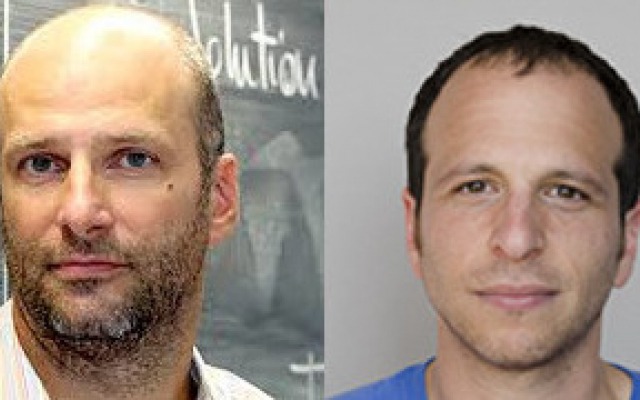
We want to advertise the Optimization in Data Science Week: three different talks that will be given next week by two world-class experts in optimization for data science. The Tuesday and Thursday talks are organized within the Statistics and Operation Research Seminar series. The Wednesday talk is addressed for a wider audience - please help us spread the news and consider coming to all three talks.
The talks are:
** On Tuesday, March 13, 12:00pm, Room 24.013, Ben Recht (University of California, Berkeley) will give a talk on “A Dynamical View of Convex Optimization Algorithms”.
Abstract: Convex optimization provides a powerful toolkit for robust and efficient solutions of difficult engineering problems. However, it is laborious to extend and generalize the mathematical guarantees of simple convex primitives. In this talk, I will show that much of the analysis and design of optimization algorithms can be automated, and will demonstrate that multiple objectives—such as robustness, accuracy, and speed—can be balanced using tools from dynamical systems. Noting that all iterative algorithms are dynamical systems, I will illustrate how most of the popular methods in optimization can be cast as a family of feedback systems studied in control theory. Leaning on this abstraction enables us to apply powerful, control-theoretic methods to algorithm analysis. I will show how the convergence rates of most common algorithms—including gradient descent, mirror descent, Nesterov’s method, etc. — can be verified using a unified set of potential functions. I will then describe how such potential functions can themselves be found by solving constant-sized semidefinite programming problems. I will close with a discussion of how these techniques can be used to search for optimization algorithms with desired performance characteristics, proposing a new methodology for algorithm design.
** On Wednesday, March 14, 12:30pm, Auditorium of the Poble Nou campus, Ben Recht will give a talk on “The statistical foundations of learning to control”.
Abstract: Given the dramatic successes in machine learning and reinforcement learning over the past half decade, there has been a resurgence of interest in applying these techniques to continuous control problems in robotics, self-driving cars, and unmanned aerial vehicles. Though such control applications appear to be straightforward generalizations of standard reinforcement learning, few fundamental baselines have been established prescribing how well one must know a system in order to control it. In this talk, I will discuss how one might merge techniques from statistical learning theory with robust control to derive such baselines for such continuous control. I will explore several examples that balance parameter identification against controller design and demonstrate finite sample tradeoffs between estimation fidelity and desired control performance. I will describe how these simple baselines give us insights into shortcomings of existing reinforcement learning methodology. I will close by listing several exciting open problems that must be solved before we can build robust, safe learning systems that interact with an uncertain physical environment.
** On Thursday, March 15, 12:00pm, Room 24.013, Andrea Lodi (Polytechnique Montréal) will give a talk on “On big data, optimization and learning”.
Abstract: In this talk I review a couple of applications on Big Data that I personally like and I try to explain my point of view as a Mathematical Optimizer - especially concerned with discrete (integer) decisions - on the subject. I advocate a tight integration of Machine Learning and Mathematical Optimization (among others) to deal with the challenges of decision-making in Data Science. For such an integration I try to answer three questions: 1) what can optimization do for machine learning? 2) what can machine learning do for optimization? 3) which new applications can be solved by the combination of machine learning and optimization?
About the speakers:
** Benjamin Recht is an Associate Professor in the Department of Electrical Engineering and Computer Sciences at the University of California, Berkeley. Ben's research group studies the theory and practice of optimization algorithms with a focus on applications in machine learning and data analysis. They are particularly interested in busting machine learning myths and establishing baselines for data analysis. Ben is the recipient of a Presidential Early Career Awards for Scientists and Engineers, an Alfred P. Sloan Research Fellowship, the 2012 SIAM/MOS Lagrange Prize in Continuous Optimization, the 2014 Jamon Prize, the 2015 William O. Baker Award for Initiatives in Research, and the NIPS Test of Time Award.
** Andrea Lodi is a leading international researcher in mixed linear and nonlinear programming. As Canada Excellence Research Chair in Data Science for Real-Time Decision-Making at Polytechnique Montréal, he holds Canada’s main chair in operations research. Andrea is interested in developing new models and algorithms that would make it possible to process a large quantity of data from multiple sources both rapidly and effectively. Through his research, he is looking for solutions designed to improve the electricity market, rail transport logistics, and health-care planning. Andrea’s innovative work has earned him several awards, including the Google Faculty Research Award in 2010 and the IBM Faculty Award in 2011. In 2005 and 2006, he was a fellow in the prestigious Herman Goldstine program at the IBM Thomas J. Watson Research Center in New York.
